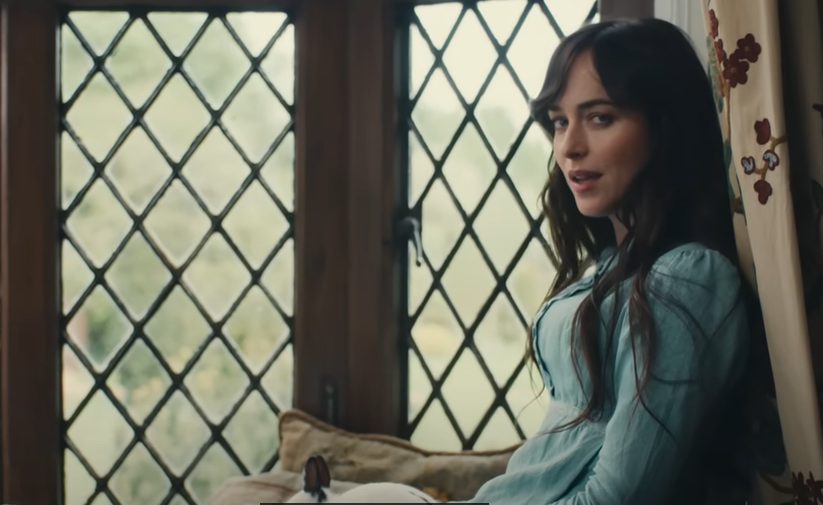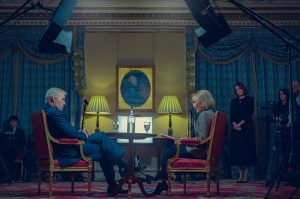Full marks to whoever tweeted, after watching the trailer for the dire new version of Jane Austen’s Persuasion, that, “I’m sorry but Dakota Johnson has the face of someone who knows what an iPhone is.” In that pithy phrase, the failings of Carrie Cracknell’s film are laid bare immediately. Johnson, despite the utter dreadfulness of the Fifty Shades films that launched her to fame, is a talented and likable actress, but she is also contemporary in a way that many of her peers are. You can dress her in all the crinolines and bonnets and Regency finery in the world, but she still looks like a California resident from 2022 cosplaying, rather than an inhabitant of early nineteenth-century Britain.
But Johnson is not the only problem with Persuasion. Somewhere early in production, someone — perhaps Cracknell, perhaps the credited screenwriters Ronald “Rain Man” Bass and Alice Victoria Winslow, perhaps the indignant ghost of Austen, summoned by Ouija board — decided it would be an excellent idea to attempt to cross-breed Fleabag and Bridgerton. Quite the mongrel has resulted. Johnson’s Anne Elliot is no longer the lovelorn spinster of Austen’s novel, poignantly trying to reconcile with her lost love Captain Wentworth, but an altogether archer, smirkier figure, who drinks wine from the bottle, refers to sheet music as “my playlist” and addresses the camera whenever she can, breaking the fourth wall with such heavy-handed inelegance that one fears for the film’s lavish Bath-based interiors. The only thing missing is an Adele ballad.
Oh, it’s a dreadful film, and one that has been rightly slaughtered by the critics already. It’s bad in many of the ways that Tom Hooper’s equally dire Cats was, in that it takes an existing and much-loved property that wasn’t crying out to be reinvented, and does so in an inelegant and profoundly irritating way. I was reminded at several points of a hyperactive child painting itself in crayon and running around shouting at the top of its voice. This might even be an improvement on the endless banalities in Bass and Winslow’s screenplay, whether it’s Anne mournfully saying of herself and Wentworth, “We’re strangers. Worse than strangers, we’re exes.” Or Austen’s snappy line, “The worst of Bath was the number of its plain women. He did not mean to say that there were no pretty women, but the number of the plain was out of all proportion,” being rendered into banality as, “It’s often said that if you’re a five in London, you’re a ten in Bath.”
I could go on; I must not go on. As the film will not be receiving a conventional cinematic release, but will instead be launching onto Netflix, it will be difficult to tell whether it would have flopped commercially. But what makes the whole farrago so entirely depressing is the certain knowledge that its idiot-level approach is not a result of Cracknell’s inexperience — this is her debut — but a carefully considered idea. Bridgerton’s cheerfully lowest common denominator approach might have appalled purists, but it attracted tens of millions of viewers — and, more importantly, subscribers.
Just as the sub-sub Fleabag archness already seems to belong to a bygone era, so, ironically enough, the resistible combination of millennial unoriginality and smirking meta-literality has already made this film seem so 2019 as for it to be already dated. To quote Alicia Silverstone in Clueless — an infinitely richer, wittier and, it must be said, more Austenian adaptation — “It’s like a painting, see? From far away, it’s okay, but up close it’s a big old mess.”


















